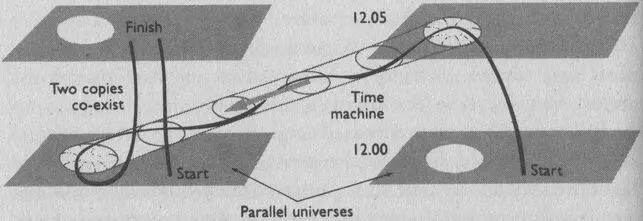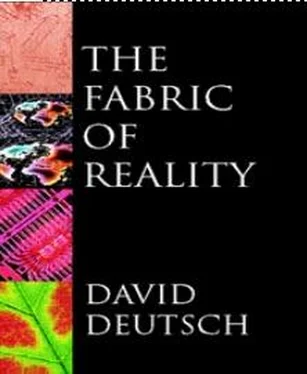David Deutch - The Fabric of Reality
Здесь есть возможность читать онлайн «David Deutch - The Fabric of Reality» весь текст электронной книги совершенно бесплатно (целиком полную версию без сокращений). В некоторых случаях можно слушать аудио, скачать через торрент в формате fb2 и присутствует краткое содержание. ISBN: , Жанр: Физика, Философия, на английском языке. Описание произведения, (предисловие) а так же отзывы посетителей доступны на портале библиотеки ЛибКат.
- Название:The Fabric of Reality
- Автор:
- Жанр:
- Год:неизвестен
- ISBN:0-7139-9061-9
- Рейтинг книги:4 / 5. Голосов: 2
-
Избранное:Добавить в избранное
- Отзывы:
-
Ваша оценка:
- 80
- 1
- 2
- 3
- 4
- 5
The Fabric of Reality: краткое содержание, описание и аннотация
Предлагаем к чтению аннотацию, описание, краткое содержание или предисловие (зависит от того, что написал сам автор книги «The Fabric of Reality»). Если вы не нашли необходимую информацию о книге — напишите в комментариях, мы постараемся отыскать её.
The Fabric of Reality — читать онлайн бесплатно полную книгу (весь текст) целиком
Ниже представлен текст книги, разбитый по страницам. Система сохранения места последней прочитанной страницы, позволяет с удобством читать онлайн бесплатно книгу «The Fabric of Reality», без необходимости каждый раз заново искать на чём Вы остановились. Поставьте закладку, и сможете в любой момент перейти на страницу, на которой закончили чтение.
Интервал:
Закладка:
I and my alter ego in this experiment have had different experiences. He saw someone emerging from the time machine at noon, and I did not. Our experiences would have been equally faithful to our intention, and equally non-paradoxical, had our roles been reversed. That is, I could have seen him emerging from the time machine at noon, and then not used it myself. In that case both of us would have ended up in the universe I started in. In the universe he started in, the laboratory would remain empty.
Which of these two self-consistent possibilities will the virtual-reality generator show me? During this rendering of an intrinsically multiversal process, I play only one of the two copies of me; the program renders the other copy. At the beginning of the experiment the two copies look identical (though in physical reality they are different because only one of them is connected to a physical brain and body outside the virtual environment). But in the physical version of the experiment — if a time machine existed physically — the two universes containing the copies of me who were going to meet would initially be strictly identical, and both copies would be equally real. At the multiverse-moment when we met (in one universe) or did not meet (in the other), those two copies would become different. It is not meaningful to ask which copy of me would have which experience: so long as we are identical, there is no such thing as ‘which’ of us. Parallel universes do not have hidden serial numbers: they are distinguished only by what happens in them. Therefore in rendering all this for the benefit of one copy of me, the virtual-reality generator must recreate for me the effect of existing as two identical copies who then become different and have different experiences. It can cause that literally to happen by choosing at random, with equal probabilities, which of the two roles it will play (and therefore, given my intention, which role I shall play). For choosing randomly means in effect tossing some electronic version of a fair coin, and a fair coin is one that shows ‘heads’ in half the universes in which it is tossed and ‘tails’ in the other half. So in half the universes I shall play one role, and in the other half, the other. That is exactly what would happen with a real time machine.

FIGURE 12.3 Multiverse paths of a time traveller trying to ‘enact a paradox’.
We have seen that a virtual-reality generator’s ability to render time travel accurately depends on its having detailed information about the user’s state of mind. This may make one briefly wonder whether the paradoxes have been genuinely avoided. If the virtual-reality generator knows what I am going to do in advance, am I really free to perform whatever tests I choose? We need not get into any deep questions about the nature of free will here. I am indeed free to do whatever I like in this experiment, in the sense that for every possible way I may choose to react to the simulated past — including randomly, if I want to — the virtual-reality generator allows me to react in that way. And all the environments I interact with are affected by what I do, and react back on me in precisely the way they would if time travel were not taking place. The reason why the virtual-reality generator needs information from my brain is not to predict my actions, but to render the behaviour of my counterparts from other universes. Its problem is that in the real version of this situation there would be parallel-universe counterparts of me, initially identical and therefore possessing the same propensities as me and making the same decisions. (Farther away in the multiverse there would also be others who were already different from me at the outset of the experiment, but a time machine would never cause me to meet those versions.) If there were some other way of rendering these people, the virtual-reality generator would not need any information from my brain, nor would it need the prodigious computational resources that we have been envisaging. For example, if some people who know me well were able to mimic me to some degree of accuracy (apart from external attributes such as appearance and tone of voice, which are relatively trivial to render) then the virtual-reality generator could use those people to act out the roles of my parallel-universe counterparts, and could thereby render time travel to that same degree of accuracy.
A real time machine, of course, would not face these problems. It would simply provide pathways along which I and my counterparts, who already existed, could meet, and it would constrain neither our behaviour nor our interactions when we did meet. The ways in which the pathways interconnect — that is, which snapshots the time machine would lead to — would be affected by my physical state, including my state of mind. That is no different from the usual situation, in which my physical state, as reflected in my propensity to behave in various ways, affects what happens. The great difference between this and everyday experience is that each copy of me is potentially having a large effect on other universes (by travelling to them). Does being able to travel to the past of other universes, but not our own, really amount to time travel? Is it just inter-universe travel that makes sense, rather than time travel? No. The processes I have been describing really are time travel. First of all, it is not the case that we cannot travel to a snapshot where we have already been. If we arrange things correctly, we can. Of course if we change anything in the past — if we make it different from how it was in the past we came from — then we find ourselves in a different past. Fully fledged time travel would allow us to change the past. In other words, it allows us to make the past different from the way we remember it (in this universe). That means different from the way it actually is, in the snapshots in which we did not arrive to change anything. And those include, by definition, the snapshots we remember being in.
So wanting to change the specific past snapshots in which we once were does indeed not make sense. But that has nothing to do with time travel. It is a nonsense that stems directly from the nonsensical classical theory of the flow of time. Changing the past means choosing which past snapshot to be in, not changing any specific past snapshot into another one. In this respect, changing the past is no different from changing the future, which we do all the time. Whenever we make a choice, we change the future: we change it from what it would have been had we chosen differently. Such an idea would make no sense in classical, spacetime physics with its single future determined by the present. But it does make sense in quantum physics. When we make a choice, we change the future from what it will be in universes in which we choose differently. But in no case does any particular snapshot in the future change. It cannot change, for there is no flow of time with respect to which it could change. ‘Changing’ the future means choosing which snapshot we will be in; ‘changing’ the past means exactly the same thing. Because there is no flow of time, there is no such thing as changing a particular past snapshot, such as one we remember being in. Nevertheless, if we somehow gain physical access to the past, there is no reason why we could not change it in precisely the sense in which we change the future, namely by choosing to be in a different snapshot from the one we would have been in if we had chosen differently.
Arguments from virtual reality help in understanding time travel because the concept of virtual reality requires one to take ‘counter-factual events’ seriously, and therefore the multi-universe quantum concept of time seems natural when it is rendered in virtual reality. By seeing that past-directed time travel is within the repertoire of a universal virtual-reality generator, we learn that the idea of past-directed time travel makes perfect sense. But that is not to say that it is necessarily physically achievable. After all, faster-than-light travel, perpetual motion machines and many other physical impossibilities are all possible in virtual reality. No amount of reasoning about virtual reality can prove that a given process is permitted by the laws of physics (though it can prove that it is not: if we had reached the contrary conclusion, it would have implied, via the Turing principle, that time travel cannot occur physically). So what do our positive conclusions about virtual-reality time travel tell us about physics?
Читать дальшеИнтервал:
Закладка:
Похожие книги на «The Fabric of Reality»
Представляем Вашему вниманию похожие книги на «The Fabric of Reality» списком для выбора. Мы отобрали схожую по названию и смыслу литературу в надежде предоставить читателям больше вариантов отыскать новые, интересные, ещё непрочитанные произведения.
Обсуждение, отзывы о книге «The Fabric of Reality» и просто собственные мнения читателей. Оставьте ваши комментарии, напишите, что Вы думаете о произведении, его смысле или главных героях. Укажите что конкретно понравилось, а что нет, и почему Вы так считаете.












